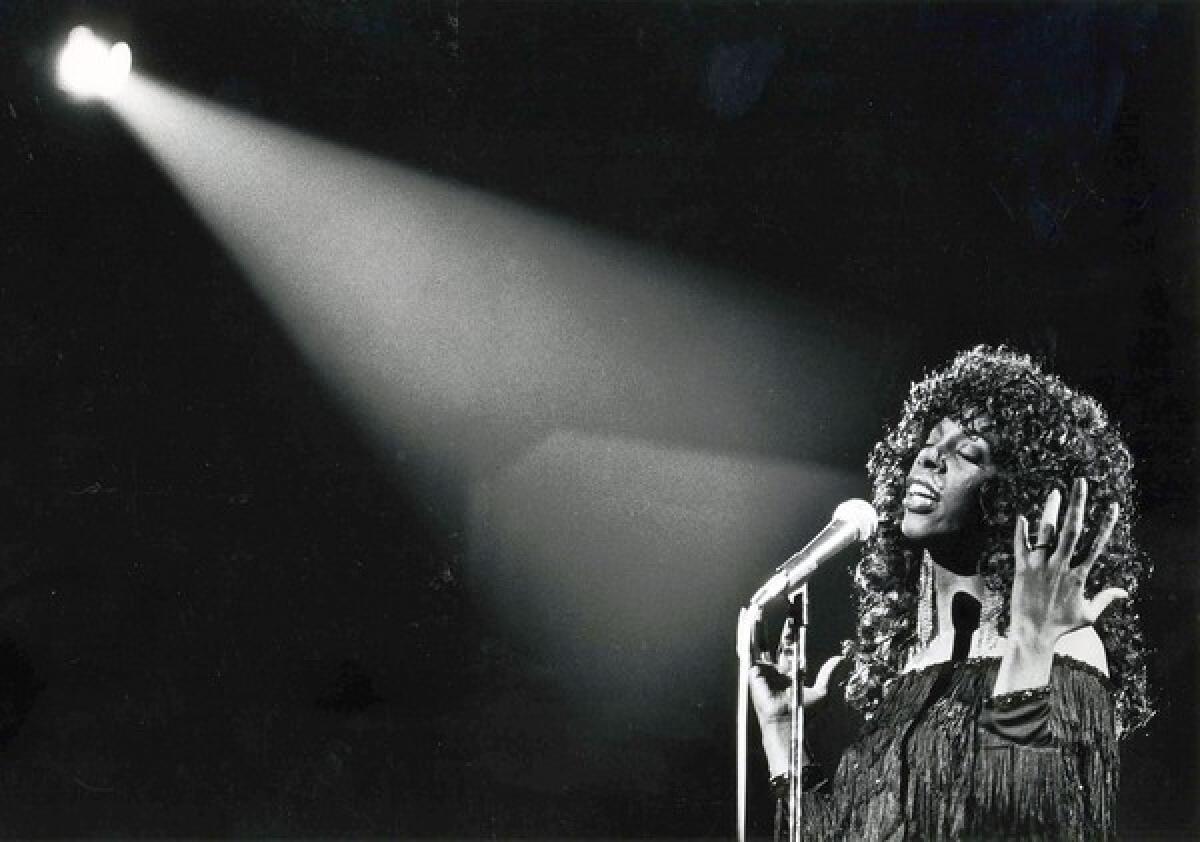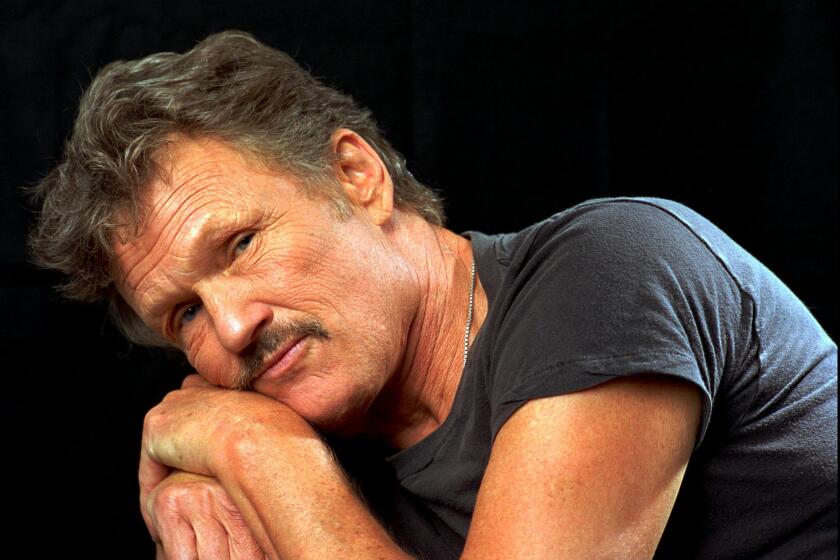From the archives: Donna Summer dies at 63; diva of disco

In 1975, Donna Summer released a pop single unlike any before it.
The singer, then an unknown in the U.S., was living in Germany and working with Italian producer Giorgio Moroder and lyricist Pete Bellotte. Together they came up with a breathy, minimalist number that sounded flagrantly sexy.
FOR THE RECORD:
Donna Summer: The obituary of singer Donna Summer in the May 18 LATExtra section described her self-titled 1982 album as her first for the Geffen Records label. Her first Geffen album was 1980’s “The Wanderer.” —
Summer’s coos acted as musical erotica atop a simple, four-on-the-floor drum beat. “Love to Love You Baby,” all 17 minutes of it, set a template that would ignite Summer’s career, and a style that defined an era: disco.
PHOTOS: Donna Summer | 1948-2012
She became the face and voice of one of the most powerful music and cultural movements in America. As a disco icon, she projected an empowering African American femininity that would influence artists from Grace Jones to Beyonce and Rihanna, and help make her a figurehead of gay club life. As an artist, her music was incalculably influential.
Her singles with Moroder like “I Feel Love” are considered early electronic dance music, now a defining sound of today’s top-grossing pop. And she survived the disco backlash of the late 1970s and early ‘80s to remain one of pop’s most pioneering artists, whose legacy can still be heard in Lady Gaga, the Electric Daisy Carnival and countless nightclubs around the world.
Summer, 63, died Thursday at her Naples, Fla., home after a long struggle with cancer. In a statement, her family confirmed her death.
One of seven siblings in a churchgoing family that encouraged spirituality and singing in equal measure, she was born LaDonna Andrea Gaines in suburban Boston onNew Year’s Evein 1948.
An early fan of gospel singer Mahalia Jackson, Summer sang in a psychedelic rock band called Crow in the late 1960s. She left home for New York City at 18 and quickly landed a role in a touring production of the Broadway show “Hair.”
She spent the next three years living and touring in Europe. While there she met and married singer Helmuth Sommer, and took a variation of his last name as her stage name. In Europe she also met Moroder, whose early dance tracks were making an impact there.
“Love to Love You Baby” was their first hit together. A shortened version of it that was released in 1975 by Casablanca, then a hot label, peaked at No. 2 on the Billboard singles chart.
“Those groans and moans were the hardest things I ever had to record,” she told The Times in 1976. “At first I couldn’t play the song at home because I couldn’t cope with hearing myself groan. It made me very uneasy that I was making something public out of feelings and sounds that should be private.”
The song was the first of a string that not only helped bring disco to the mainstream, but predicted the rise of techno and house music. Among them were “I Feel Love,” “Bad Girls,” “She Works Hard for the Money,” and “On the Radio.”
“She was never happy being associated as a sex image with ‘Love to Love You Baby,’ ” said Larry Harris, who co-founded Casablanca Records with Neil Bogart. “She had a religious background, so that made her uncomfortable. People always talked about the sex song, and she wanted to be remembered for more than that. She will be. She never stopped.”
Her work with Moroder bridged sexually adventurous pop with early synth experimentation and the soul and R&B music Summer was raised with.
“Donna Summer set a template for the dance diva,” said Jason Bentley, DJ and music director at KCRW-FM (89.9). “Her unique pairing with Giorgio Moroder’s techno sensibility set her apart and was an early example of electronic music influencing pop. Everything was sexually charged and she served up a lot of timeless anthems.”
Summer’s decadent outfits and empowering image helped make her one of the first pop musicians embraced by gay and straight audiences alike.
“With a song like ‘Love to Love You Baby,’ she did something culturally important too,” said Robert Santelli, executive director of the Grammy Museum. “She bridged the gap between the gay and straight audiences in disco. She crossed over into pop as well, and when a Donna Summer song came on, she would bring both straight and gay out there dancing.”
Summer broke down musical borders as well. In 1979, she was paired with Barbra Streisand, already a veteran star of the stage and screen, for the duet “No More Tears (Enough Is Enough).” And when Summer released the double album”Bad Girls” in 1979, her song “Hot Stuff” won a Grammy for best rock vocal performance.
After giving birth to her daughter Mimi in 1973 and divorcing Sommer shortly thereafter, she married her musical collaborator Bruce Sudano in 1980, and had two more daughters — Brooklyn and Amanda. Her husband and three daughters survive her.
In 1980, Summer left Casablanca to join the newly formed Geffen Records. Her self-titled, 1982 debut for the label featured Bruce Springsteen on guitar in “Protection,” a song he also wrote. Summer moved from Los Angeles to Nashville in the mid-1990s, bolstering a lifelong interest in country music; she co-wrote Dolly Parton’s country hit “Starting Over Again.”
As an actress and TV personality, she had a recurring role on the hit 1990s sitcom “Family Matters,” playing Aunt Oona from Altoona, and nearly a decade later was a guest judge on Bravo’s music reality show “Platinum Hit.” In 2003, she published her autobiography “Ordinary Girl” and had established herself as a visual artist, selling more than $1.2 million worth of Expressionist-style work.
She released her final album, “Crayons,” in 2008. It debuted at No. 17 on the Billboard charts, a career high for her, and she performed with the female finalists of “American idol” to promote it.
As she got older, she returned to her gospel roots and Christian faith in her performances, and told The Times in the 1990s: “Gospel is music that’s both for yourself and to be shared. It transcends people’s circumstances. I think that’s what spirituals are all about. We’re not just one-sided beings — we tend to nurture the flesh, but it’s OK to nurture the soul too.”
Today’s dance producers and pop singers readily admit that Summer’s work, once the victim of the late-’70s disco backlash, set the tone for what is now the most dominant aesthetic in pop — dance music. “I Feel Love” was one of the first hit singles to be made entirely on synthesized instruments, and disco’s steady drumming, electronic arrangements and open romanticism formed the sonic template now used by such top pop producers as Will.i.am and David Guetta.
“David Guetta once told me that ‘I Feel Love’ is the reason he’s a producer,” said Evan “Kidd” Bogart, son of Casablanca founder Neil Bogart, and a songwriter who co-wrote tracks with Summer for her final album. “You can hear the stuff that Donna, Giorgio Moroder and my dad created in the ‘70s at a bat mitzvah, a wedding or a birthday party, and it paved the way for what we know as dance music of today. Her legacy is in everything we hear now.”
PHOTOS: Donna Summer | 1948-2012
More to Read
Start your day right
Sign up for Essential California for the L.A. Times biggest news, features and recommendations in your inbox six days a week.
You may occasionally receive promotional content from the Los Angeles Times.









